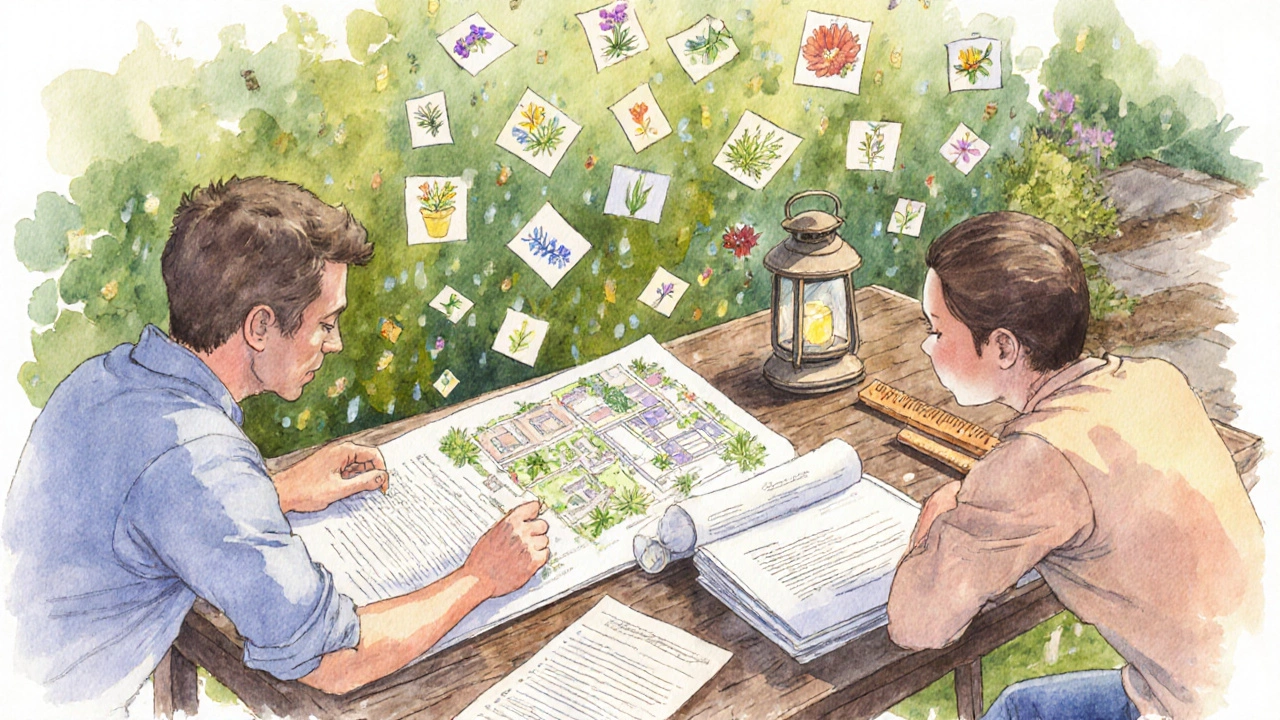Landscaping Project Cost Estimator
Project Cost Calculator
Cost Estimate
Enter your project details to see the estimate
Negotiation Tips
Your negotiation tips will appear here based on your estimate
When you finally decide to give your yard a fresh look, the biggest hurdle often isn’t the design-it’s the conversation you have with the Landscaper is a professional who plans, designs, and implements outdoor spaces, handling everything from plant selection to hardscape installation. You want great results without blowing your budget, and that means mastering the art of landscaper negotiation. Below you’ll find a step‑by‑step playbook that turns a potentially stressful price talk into a collaborative planning session.
1. Clarify Your Own Vision and Limits
Before you even pick up the phone, write down exactly what you expect. Break the project into three core buckets:
- Scope of work - the tasks you need completed, like grading, planting, irrigation, and patio installation.
- Budget ceiling - the absolute most you’re willing to spend.
- Timeline - when you want the project wrapped up, accounting for seasonal planting windows.
Having these numbers in front of you gives you confidence and prevents the landscaper from steering the conversation toward options you never wanted.
2. Do Your Homework and Run a Reference Check
The best leverage comes from knowing who you’re dealing with. Conduct a quick Reference check is the process of contacting a landscaper’s past clients to verify quality, reliability, and communication style. Ask about:
- Project adherence to the original estimate.
- Quality of workmanship and after‑care.
- How the landscaper handled unexpected issues.
A landscaper with glowing references will be more open to fair pricing, while a spotty record signals you should negotiate harder or walk away.

3. Put Everything in a Landscaping Contract
Once you’ve narrowed down candidates, ask for a written Landscaping contract is a legal document that outlines the agreed scope, materials, timeline, payment schedule, and warranties for a landscaping project. This contract should specifically list the Scope of work is the detailed description of each task the landscaper will perform, including quantities and standards and the type of Materials is all physical items such as plants, pavers, mulch, soil amendments, and irrigation components that will be used in the project. When the contract is crystal‑clear, there’s less room for surprise add‑ons later.
4. Choose the Right Pricing Model
Landscapers usually quote in three ways. Below is a quick comparison so you can pick the one that aligns with your comfort level.
| Pricing Model | How It's Calculated | Pros | Cons |
|---|---|---|---|
| Fixed Price | Total project cost agreed up front. | Budget certainty; low admin work. | Less flexibility if scope changes. |
| Hourly Rate | Charge per labor hour plus materials. | Good for undefined or evolving projects. | Hard to predict final cost. |
| Per‑Square‑Foot | Rate applied to the area to be landscaped. | Simple metric; easy to compare quotes. | May ignore complexity of design. |
If you value predictability, lock in a fixed price after the contract has nailed down the Scope of work. If you anticipate changes (like adding a water feature later), an hourly rate gives you wiggle room.
5. Negotiation Tactics That Actually Work
Now the real talk. Here are six tactics you can use, backed by real‑world outcomes:
- Anchor with a realistic figure. Start with a number slightly below your budget ceiling. The landscaper will adjust, and you’ll land in the middle.
- Bundle services. Ask for a discount if you combine planting, irrigation, and hardscape in one contract. Many landscapers reward larger scopes with a 5‑10% reduction.
- Ask for itemized pricing. When every line item is visible, you can spot “padding” - like charging premium for generic mulch.
- Leverage seasonal discounts. Early spring or late fall is slower for landscapers, leading to better rates.
- Offer a quick payment schedule. A 10% discount for paying 30 days upfront is common and can shave $200‑$500 off a $5,000 job.
- Plan for a maintenance contract. Securing future upkeep at a reduced rate can be a win‑win and often unlocks a better upfront price.
Always frame proposals as “I want this to work for both of us” rather than “I’m low‑balling you.” A collaborative tone keeps the landscaper from becoming defensive.
6. Seal the Deal and Guard Against Hidden Costs
When you’ve agreed on numbers, write them into the Landscaping contract and include a clause for a Maintenance plan is a scheduled service agreement covering seasonal clean‑ups, fertilization, and pruning that extends the life of the landscape installation. Include:
- Payment milestones (e.g., 30% deposit, 40% after hardscape, 30% on final walkthrough).
- Change‑order process - any work beyond the original scope must be approved in writing with a clear cost impact.
- Warranty terms - most reputable landscapers guarantee plant health for at least 90 days.
If the landscaper tries to add extra items later, refer back to the change‑order clause. This protects you from surprise invoices.
7. Quick Negotiation Checklist
- Define scope, budget, and timeline on paper.
- Gather at least three references and conduct a reference check.
- Insist on a written landscaping contract with itemized costs.
- Pick the pricing model that matches your risk tolerance.
- Use anchoring, bundling, and seasonal discounts during talks.
- Secure a maintenance plan and define change‑order procedures.
- Review the contract with a trusted friend or legal advisor before signing.
Frequently Asked Questions
How do I know if a landscaper’s estimate is fair?
Compare at least three quotes that break down labor, materials, and contingency. Look for consistency in per‑square‑foot rates and check the itemized list for any unusually high line items. A fair estimate will also match the quality of plants and hardscape materials you expect.
Can I negotiate the warranty period?
Yes. Most landscapers offer a 60‑90 day plant‑health warranty. If you’re committing to a longer maintenance plan, ask them to extend the warranty to six months or more as part of the agreement.
What should I do if the project goes over budget?
Refer back to the contract’s change‑order clause. Any additional cost must be approved in writing before work proceeds. If the landscaper didn’t follow this process, you can dispute the extra charge.
Is a fixed‑price contract better than hourly?
Fixed price gives you budget certainty, especially when you have a clear scope. Hourly rates are useful when the design is still fluid. Choose based on how well you can define the project up‑front.
How often should I meet the landscaper during the project?
Schedule brief check‑ins at key milestones - after site prep, after hardscape installation, and before planting. Regular communication helps catch issues early and keeps the project on schedule.

